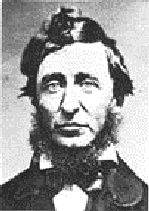

Inspired both by Henry David Thoreau's love of the natural world and his dislike of big government, the Thoreau Institute seeks ways to protect the environment without regulation, bureaucracy, or central control. The Institute was founded in 1975 under the name of Cascade Holistic Economic Consultants to help environmentalists and others understand and influence public land management.
Since then, the Institute has worked as a consultant to or partner with every major national environmental group as well as numerous state and local groups. Between 1980 and 1998 the Institute also published a magazine, first titled Forest Planning and most recently called Different Drummer. Today the Institute distributes its work over the internet or in books such as The Vanishing Automobile and Other Urban Myths.
The Institute's Board of Directors includes representatives of a variety of public land interest groups. The board hopes that it can break down the barriers between interest groups that have prevented the development of good public land policies.
The Institute's primary staff includes:
Thoreau Institute staff travel a great deal and are best contacted via email.
During the 1980s, Institute research on Forest Service and other agencies demonstrated that most environmental controversies on federal lands are due to the budgetary incentives facing public land managers. The budgetary process typically rewards managers for losing money on environmentally destructive activities and penalizes them for making money or for emphasizing environmentally benign activities.
In 1988, Island Press published Reforming the Forest Service, by Randal O'Toole, which proposed user fees, trust funds, and other checks and balances aimed at improving national forest management while saving taxpayers $2 billion per year. Since then, the Institute has found similar problems with the National Park Service and several other agencies. Karl Hess's book, Rocky Times in Rocky Mountain National Park, published by University of Colorado Press, found major ecological problems with Park Service management. This contributed to recommendations for reforming the Park Service in Tarnished Jewels: The Case for Reforming the Park Service.
Henry David Thoreau, America's first environmentalist, wrote in wildness is the preservation of the world. But he also firmly believed that that government is best which governs least.
Institute research has consistently found that big government activities programs that are centrally planned, centrally budgeted, and controlled by prescriptive laws do not work. As an alternative, Institute research now aims to find small government means, including such techniques as user fees, markets, and incentives, to protect the environment.
Another important Institute principle is that there are no enemies of the environment only people with different incentives. In a variety of settings, the Institute is working with environmentalists, timber company representatives, ranchers, miners, agency officials, and other resource users and managers to find win-win solutions to environmental problems.
You can reach the Thoreau Institute at:
P. O. Box 1590
Bandon, Oregon 97411
541-347-1517
413-778-2476 fax
rot at ti.org email